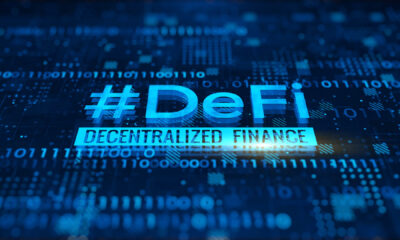Here is an Interview Investorsking Had With Paul Mak, CEO of Bonded.Finance
There is hardly any other fintech industry that is growing as fast as the field of decentralized finance (DeFi). While many investors and fintech enthusiasts had never heard of DeFi at the beginning of the year, it now dominates the blockchain sector, with some projects reaching valuations north of $3 billion.
According to DefiPulse, a real-time data platform for DeFi investments, more than $10 billion is currently locked in various DeFi protocols.Some of the most popular DeFi use cases to date include decentralized borrowing and lending, derivatives, and yield farming. Today we spoke with an aspiring DeFi entrepreneur who wants to go one step further. With his project Bonded.Finance, Paul Mak wants to leverage a dormant, unused value of 50 billion dollars.
Here is what Mak has to say about his project and the future of decentralized finance.
What is Bonded.Finance and how does it fit into the Decentralized Finance space?
Bonded finance is a new lending protocol, innovating in the DeFi space by enhancing the versatility of smart contracts and how they manage and utilise digital assets. We construct and deploy experimental new instruments that enable us to harvest non-performing capital out of almost any digital asset and then put that capital to work in a lending environment. Once deployed these products operate autonomously free from central party authority.
Why is there a need for Bonded right now and what kind of people should be interested in it?
The crypto market is a paradox because it’s nascent and highly active with millions of micro-investors in a market that runs 24/7. To some degree this fosters innovation but the combination of immaturity and frenetic activity creates inefficiencies. Two inefficiencies are illiquidity and the breadth of distribution. Capital is spread across 700 exchanges and there are some 7000 projects vying for attention. With capital continually redistributing, start-ups are not garnering the support they need. Remember, in traditional markets early stage investments are not market-traded assets as young companies find their footing. This has been an ongoing problem and we see great projects lose value unfairly and get eviscerated by angry, abandoning communities. Bonded has identified some $50b in dormant capital sitting in altcoins, and by that I mean, the collective market cap of active projects with tokens that have earning potential. Our smart instruments enable us to harvest and repurpose that unused capital to offer benefits to longer-term investors, teams and even to reignite interest in projects that may have fallen off the radar. As for who should be interested in it—we think everyone in crypto frankly. Coin issuers have an easy way to enhance utility and we may have found a way to make HODLing sexy again. It is our hope that altcoin investors the world over will rejoice but we’ll settle for an active, fee generating network that provides stability and value to help offset the growing pains of our industry. For those with boots on the ground, this is great fit for farmers hunting returns as well as less savvy, plug and play investors seeking the highest sustainable yields in the space.
What is the current status of the platform’s development? Can you share a brief timeline of what’s ahead?
Sure thing. Our interface, which is the launchpad, is built and our first lending instruments are almost ready for testing. We anticipate the debut product due for release shortly after our public raise this month. DeFi moves so fast and as innovators, we will be pushing the envelope to rapidly evolve and deploy products that cater to the fast-moving demands of today’s users. Therefore, we plan on an aggressive rollout of products following our sale without sacrificing security. Tech aside, we have some fantastic partnerships to announce in the coming weeks, a large exchange listing and of course our IDO and liquidity event.
Our website is live and gives a rough estimate of anticipated development milestones.
Can you tell us more about your personal background and why you decided to launch Bonded?
I’m a seasoned investor/operator with over 15 years in the game. Precious metals, equities, property, angel investing and start-up capital; I’ve sort of done it all prior to crypto. Personally, I’m a Dad of two boys, still on the right side of 40 with an ailing back that keeps me honest. My work life has me predominantly between south east asia, (primarily Singapore and Indonesia) Australia and NZ.
As for why I launched Bonded, I like to think of it as the perfect storm. I’ve been operating a small family fund for 7 years, typically allocating capital to early stage companies. In 2017, I was exposed in crypto with a rather diverse portfolio. In 2018, the bear market really took hold and we started taking on water. Illiquidity was a glaring problem and we ended up holding a basket of assets that couldn’t be sold down at a reasonable price. I started considering alternative ways to accomplish this. The losses didn’t deter me but I was frustrated because I felt, even in the bear market, many teams navigated poorly and made avoidable mistakes. Since then, I’ve been eager to run my own ship in this space or at least invest with a stronger grip on the steering wheel. One of the projects we invested in was a DeFi solution, looking to change the way debt and credit is managed and monetised. I was fascinated by some of their ideas, particularly the concept of programmable debt instruments. The blockchain democratizes a number of industries but decentralizing finance is really mind-blowing to me. I’ve always loved the tech and ethos behind bitcoin and cryptocurrencies in general. The longer you’re in it and the more you learn, the deeper your convictions become and I didn’t want to sit on the sidelines as a passive investor any longer. I wanted to contribute something to the space that is sustainable and I think Bonded can accomplish that.
Many investors are comparing the current DeFi hype to the altcoin craze of 2017. What is your opinion on that?
There are definitely some shared elements but it is entirely different. Sure there’s irrational hype, scams and disregard for protocol but the similarities end there. DeFi isn’t exactly new. It is basically the original promise of bitcoin/crypto finally coming to fruition in a meaningful economic way. Sure, it’s volatile as true innovation, pre-internet took about twenty years on average. Here we have market cycles in microwaves, community creations and the internet itself promoting it. Things happen fast with incredibly short half-lives but the underlying principles of Defi are lasting and effectuating a change that’s been a couple hundred years in the making. The banks should have never owned us; we always should have owned the banks. ICOs were about the promise of a new world order for everything, a transposition of all things; some of which is fine, some of which is not ready. Defi is needed, has measurable value and current utility. Total value locked hit a billion in June I think and it took nearly two years to get there and despite a lot of hiccups, four months later, we’re at 10 billion. That’s not market caps with zero depth; that’s actual locked value.
Where do you see the DeFi space heading in the next 12 months?
Wall Street. Where else? Crypto is finally speaking the same language. The economics are simple to grasp, all we need now is 12 months of verifiable data and better accessibility. I will warn you that I’m an optimist so maybe it’s longer but that’s how I see it. The feedback loop is lightning fast in this space and the amount of capital and the velocity of that capital means we get huge amounts of data in such short time spans. 12 months of yield-generating investment vehicles, improved security and proven sustainability of the economic models and the yields become far too attractive to ignore. The better question may be: Assuming stability, at what stage would it become negligence for a fund to not have an allocation in this asset class?
Is there anything else you would like to add? Any closing thoughts?
Yes, definitely. First of all, thanks for having me and to everyone reading; Do not sleep on decentralised finance. Use it and learn it. Don’t let the volatility, rapidly cycling narratives or anything talk you out of this because this is, without doubt, the next decade of finance. Those armed with experience and knowledge will be at a significant advantage as investors, entrepreneurs and employees. Once you get under the hood, this stuff is genuinely fascinating and can pay dividends if you’ll pardon the pun. Also, any altcoin project looking to add some financial tools to help your community grow and invest with more conviction and flexibility, give us a call. In this turbulent marketplace, our solutions could really be the difference between success and failure.


 Billionaire Watch3 weeks ago
Billionaire Watch3 weeks ago
 Startups4 weeks ago
Startups4 weeks ago
 News4 weeks ago
News4 weeks ago
 News4 weeks ago
News4 weeks ago
 Bitcoin4 weeks ago
Bitcoin4 weeks ago
 Naira4 weeks ago
Naira4 weeks ago
 Forex3 weeks ago
Forex3 weeks ago
 Treasury Bills4 weeks ago
Treasury Bills4 weeks ago




















